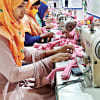Vegetable exports dip to 6-year low

Bangladesh's earnings from vegetable exports dipped to six-year low in the July-October period of the current fiscal year as high air-freight rates and increased prices eroded the competitiveness of fresh produce.
Exporters fetched just $15 million from air-shipping locally produced fruits and vegetables to Middle Eastern and European markets in the first four months of fiscal 2022-23, down 60 per cent from $38 million during the same period last year, shows data of the Export Promotion Bureau (EPB).
"Over the last six months, airlines have hiked cargo fares at will. The air-freight cost has shot up 40 per cent over the last one year," said Mohammad Mansur, general secretary of the Bangladesh Fruits, Vegetables and Allied Products Exporters' Association (BFVAPEA).
Besides, transport costs have increased following a hike in petroleum prices by the government in August this year.
As freight costs have gone up, importers, mainly in the Middle East, are showing a lack of interest for fresh farm produce from Bangladesh.
Instead, many of them are buying from West Bengal's exporters, who are shipping vegetables and fruits through Kolkata, where the air-freight rate is much lower than in Bangladesh.
"Over the last six months, airlines have hiked cargo fares at will. The air-freight cost has shot up 40 per cent over the last one year," said Mohammad Mansur, general secretary of the Bangladesh Fruits, Vegetables and Allied Products Exporters' Association
"We have to pay higher fares for cargo space in carriers as there is demand for garment shipments by air," he added.
Vegetables, one of the major exported items under agricultural products, saw a slump in earnings at a time when overall export receipts have been slowing down due to recession fears and stockpiling of major export items, namely garments, in Europe and the US, which are Bangladesh's main markets.
Overall, export earnings from agricultural products declined 24 per cent year-on-year in the July-October period, according to EPB data.
"Had the US dollar rate been equal to the rate received by remitters, we could be able to improve our competitiveness and increase earnings," said Mansur, urging Bangladesh Bank to take steps so that both exporters and remitters get the same prices for US dollars.
At present, exporters get Tk 99.50 for each US dollar while banks pay a maximum of Tk 107 to foreign exchange houses to collect remittance sent by Bangladeshi migrant workers from abroad.
The lower rate is discouraging exporters too, he added.
Some exporters also alleged a lack of cooperation from the officials at the Central Packing House under the Department of Agricultural Extension (DAE) for slowing shipments and export proceeds.
"We are not getting the expected level of help from the DAE," said Mohammad Abul Hossain, proprietor of Lee Enterprise, an exporter of fresh vegetables and fruits.
Sayed Rafiqual Amin, director of the Plant Quarantine Wing under the DAE, said they want to ensure exports by ensuring compliance, such as traceability of vegetables or fruits.
He then said a section of importers appreciate such steps.
"We are trying to provide easy and hassle-free services to exporters to accelerate shipments," Amin added.
SM Jahangir Hossain, president of the BFVAPEA, expects exports earnings to increase in the coming months due to the arrival of vegetables during winter, the main season for vegetables.
"In general, July-October is the lean season for exports as we have to depend on a limited stock of summer and monsoon vegetables," he said.
Besides, vegetables grown in Italy during summer are exported to other countries in Europe.
"So, winter is a good season, when the supply of vegetables increases while prices drop," Hossain added.

 For all latest news, follow The Daily Star's Google News channel.
For all latest news, follow The Daily Star's Google News channel. 








Comments